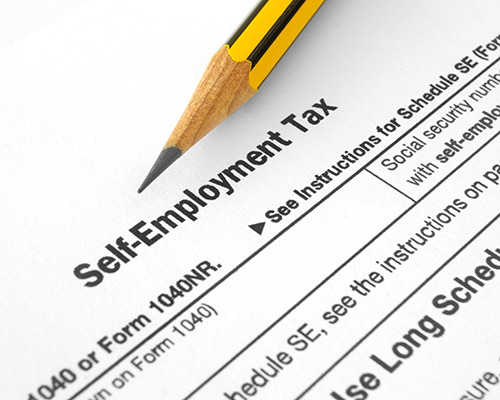
For 30 years the IRS has not mounted any offensive against business, such as LLC, LLPs and PLLCs that report earnings on a Form K-1. In a recent article published in the Journal of Accountancy, [1] it appears that there is a change coming. As a Special Agent with IRS Criminal Investigation, we investigated criminal violations of the Internal Revenue Code (IRC) and worked cooperatively with the field agents of the Examination Division. When investigating self-employed individuals, we quickly learned that recipients of Forms K-1 were able to report income without self-employment tax. Under IRC Section 1402, self-employment income is defined as the gross income derived by an individual from any trade or business carried on by the individual, less deductions attributed to the business to generate net income. Individuals report self-employment income on a Schedule C attached to their Form 1040. Other entities report income on information returns, including single or multiple shareholder S Corporation (SCorp.) on a Form 1120S, and on Form 1065 for Partnerships. Both render a Form K-1 for use on the individual’s Form 1040.
Definitions:
Schedule C, Form 1040:
As a Private Investigator filing a Schedule C, the individual is responsible for reporting gross receipts and business expenditures to arrive at a net profit from the business. The net profit is taxed by income tax rates and self-employment Social Security and Medicare rates. The private investigator, business owner, may take draws on profits and should make quarterly estimated tax payments. Generally, the owners are not paid salaries.
S Corporations (SCorp.) & Partnerships are “pass-through”: They report income on a separate information return and the shareholders or partners receive a Form K-1 for reporting on their individual Form 1040.
S Corp.: Form 1120S
This entity reports business income and expenses on a Form 1120S. The single or multiple shareholders receive income from a salary less withheld income tax and social security and from distributions. Draws should not be taken.
Some individuals try to avoid the Social Security and Medicare by not taking a salary and instead reporting on their Form 1040, the “ordinary business income” from the K-1, and paying income tax only. IRS is very familiar with this avoidance of the payment of Social Security and Medicare and has increased audit emphasis with various initiatives, including “Pass Through Entities”. A taxpayer who tries this aggressive attempt runs the risk of IRS reclassifying the distributions as salary and subject to the payment of self-employment tax, penalties, and interest. Criminal intent may also be attached with a substantial underpayment, multiple years, and with the right documentary evidence and testimony.
We have seen this avoidance treatment on SCorp returns prepared by CPA firms for their professional clients. This is not a good strategy, because if audited by the IRS the professional will owe a substantial tax liability for the unreported Social Security and Medicare tax.
For the SCorp. one shareholder, Private Investigator firm, in the past, IRS auditors view the payment of a salary of 60% to 80% of net income with income tax and employment taxes withheld, that the remaining 40% to 20% be considered as distributive earnings without self-employment tax. This has been allowed with the proper reporting of the ordinary business income and expenses on the returns.
Partnerships: Form 1065
The ordinary business income or loss from a Partnership is reported on the individual income tax Form 1040 from the contents of Form K-1 similar to the SCorp above. The income is subject to income tax, self-employment tax, and estimated tax payments.
In some instances, CPAs have advised their partnership clients to pay themselves guaranteed payments. Under IRC, Section 707(c), transactions between partners and partnerships, guaranteed payments are specifically defined in the IRC, Section 1402 (a)(13)[2] as, payments to a partner in his or her partner capacity for services or the use of capital, when determined without regard to the income of the partnership. Partners paid “guaranteed payments” not dependent on earnings, still requires self-employment tax and the payment of estimated tax payments.
It is important to note that self-employed individuals are responsible for the proper reporting of their income, regardless of the returns that represent the income, and the preparer of the returns may be subject to preparer penalties under the IRC.
Going Forward:
Overall the IRS has signaled that it intends to litigate reported exclusions of self-employment taxes on distributive earnings to LLC members who are in a position of management control or who provide significant services to an LLC.[3] At a seminar in September 2017, presented by the American Bar Association Tax Section, the Chief, Criminal Investigation (CI), Don Fort, told those present that one of the main emphasis of CI would be an investigation of employment taxes cases, which could include self-employment tax. Therefore, these areas of taxation may be changing through Tax Count and directions for IRS Chief Counsel, despite the inaction by US Congress to pass proper guidance through legislation
All Private Investigators are involved with self-employment taxes issues or you have clients that are facing problems with the IRS regarding their employment taxes or other matters, consider referring the individual or the law firm to Sage Investigations, LLC, especially if the case continues beyond your involvement. If the case requires a forensic accountant and the testimony of an Expert Witness, you can still benefit from the case by receiving a referral fee. Contact Chief Investigator Edmond Martin of Sage Investigations, LLC at 512-659-3179, email: edmartin@sageinvestigations.com. Let our 26 years as an IRS Special Agent and 16 years of Private Investigation benefit you and your clients. Please visit our website for our team and their CVs.
[1] IRS pursuing self-employment taxes from LLC members
[2] Internal Revenue Code (IRC), Section 1402 (a)(13)
[3] Ibid


 Call
Call